Despite the common phrase, baking, thankfully, isn't a science.
Last March, it seemed that the entire country had gotten into baking. Flour flew off the shelves. Baking hotlines rang off the hook. Google searches for “how to make bread” skyrocketed.
Perhaps baking was a productive way to pass the newfound time at home, or maybe it was a way to get fresh food without leaving the safety of one’s home.
There are also sadder explanations: Maybe baking was a way to take people’s minds off all the horrible things happening outside their kitchen. When someone’s kneading dough or portioning out cookies, there’s no need to think about whatever else is going on in their lives, and they hopefully get a tasty snack at the end.
However, baking can lead to its own type of anxiety. It’s nothing compared to a global pandemic, but if you’ve ever baked then you might have felt the stress: Did I mix this dough enough? Is the oven too hot? Did I misread the recipe?
A lot of this mindset comes from the idea that “baking is a science." This idea leads bakers to approach the process like a science experiment, where every variable has to be exactly on point to get reliable results.
Is there science involved in baking? Of course, and a lot of it is fascinating and useful, but that doesn’t mean that the baking process itself has to be scientific.
Baking doesn’t depend on precision any more than other types of cooking: If you’ve ever baked a recipe that measured flour in volume, then you’ve probably proved that yourself without even knowing it.
Measuring cups are a notoriously inaccurate way to measure flour, but chances are that whatever you baked still tasted pretty good. More accuracy is always better, but it’s not a science experiment – if the variables are off by a little, then it probably doesn’t matter very much.
There are finicky recipes out there, of course, but that’s true for any type of cooking. Baking’s perceived uniqueness on this front is likely because the actual cooking happens in the oven when it’s too late to change anything.
Understanding baking as a science just interferes with the actual point of amateur baking: to enjoy the process and the finished product. There’s no need to overthink it – a homemade cookie isn’t special because of some specific scientific knowledge on the baker’s part, but because we know that someone put their time and effort into it.
If anything is worth taking away from the United States' coronavirus baking craze, then it’s that sentiment. It seems that some sort of end to the pandemic is getting closer, and taking a more relaxed approach towards “post-pandemic” life might be just what we need.
After all the stress people have endured recently, it would be wrong to expect ourselves or others to reach perfect precision all the time. Just putting in the time and effort is often enough – it might not be scientific, and it won’t always turn out perfect, but sometimes that’s okay.

